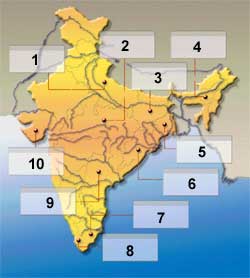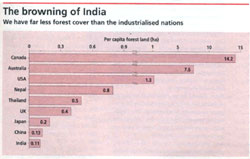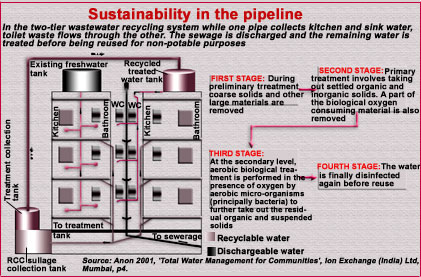
Experts favour hiking charges to halt irrigation water waste
Disciplined use of irrigation water can be encouraged by efficient supply at higher rates.

Disciplined use of irrigation water can be encouraged by efficient supply at higher rates.
The central theme of Economic Survey 2007-08 is maintaining the strong economic growth momentum of the recent period. With the annual GDP growth exceeding 8 per cent since 2003-04, the economy has moved decisively to a higher trajectory. The official forecast of 8.7 per cent for 2007-08 accords with this trend. But the figure suggests a slight deceleration, considering that the first six months of the year recorded a growth of 9 per cent or more. For 2008-09, most official forecasts have pegged the rate at 8.5 per cent or less. The key task is to regain the upward push so that the economy averages a 9 per cent or even higher growth towards the end of the 11th Plan. There are both positive and negative factors that would shape the near-term outlook. Macroeconomic fundamentals continue to inspire confidence. A sharp acceleration in the domestic investment and savings rates has sustained the high growth. Buoyant tax revenues have helped in fiscal consolidation so far. The budget will show if the government's finances are on track to meet the goals set under the Fiscal Responsibility and Budget Management Act. Inflation however remains a major worry. Over the past year global factors, notably the high prices of oil, food and other commodities as also the turmoil in financial markets have clouded the external environment. Appreciation of the rupee and a slowdown in specific segments of industry as well as in infrastructure are some of the other major areas of concern. For sustaining economic growth at high levels, policy makers are up against several challenges. Additional reforms are obviously needed. Capital inflows, especially those relating to direct investment, are expected to continue in the medium-term. Combating inflation has become more complex in the context of recent structural changes in the economy and its increasing globalisation. Among the important factors to be reckoned with are the high tariffs on agricultural products, the large share of food in the consumption basket, and the slow modernisation of agriculture and allied activities. Inadequate availability of infrastructure continues to be a major constraint on the supply side. Highlighting the need to improve social sector and human development outcomes at the level of the States, the Survey lays stress on improved delivery mechanisms for the success of programmes such as the NREGP and Bharat Nirman. In a departure from the past, Survey 2007-08 has sought to provide a more rigorous analysis and a conceptual framework, and has added a new chapter that covers subjects of topical interest. That along with the proposal to release background papers will help in disseminating timely economic information to a larger audience.
He was the archetypical activist bureaucrat. For A N YELLAPPA REDDY, former special secretary to the government of Karnataka's department of environment and ecology, the issues were real and live. He would not let avaricious politicians and big busine

Riverine fisherfolk, arguably the oldest among traders, are being sold down the river. An unholy synergy of poisoned rivers, government apathy and commercial interests has scripted the epitaph of the original stewards of the river. Ironically, their

Biotech companies and the World Trade Organisation took centrestage at the fourth conference on biological diversity, leaving traditional communities to fend for themselves

Thupstan Chhewang, Chief Executive Councillor and chairperson of the Ladakh Autonomous Hill Development Council LAHDC speaks to Down To Earth.
Western Orissa is witnessing an upheaval. In the eye of the storm is the Hirakud dam. Over 300,000 farmers dependent on its water for irrigation are indignant that industries springing up around the dam are sucking away the water they had been waiting for

The validity of traditional ecological practices, in terms of sustainability, has to be examined scientifically

The interests of the Tokyo Environmental Film Festival were varied and the films were technically superb, but most failed to focus on people

Galvanising support for the unconditional withdrawal of the new Forest Bill, NGOs and a fifth column within the bureaucracy are harrowing the government

Overexploitation, skewed pricing policies and inefficient utilisation have laid bare the bamboo"s vast reserves. While local communities clamour for the resource, and possiblities of sustainable use abound, governments dole it out to industry. Arunachal,
As a first step, the new chief ministers should declare themselves the chief environmental officers CEOs of their states
<p>One of the major events organized by the Ministry of Urban Development is the Urban Mobility Conference held in New Delhi in the first week of December each year. The theme of the latest conference held on 3rd, 4th and 5th of December 2010 at the Grand Hotel, New Delhi was “Sustainable Urban Transport: Accessibility and Inclusive Cities”.

A public interest petition in the Supreme Court to shift industries from the Taj Trapezium, based on a report forwarded by the National Environmental Engineering Research Institute, opens up a Pandora"s box of objections to experts" ways of tackling the

WHATEVER their area of work, non-governmental organisations (NGOs) have made the most headway in involving people in managing their natural resources. Says one NGO activist, "Local people are very

A few individuals are trying to bring about changes at the grassroots level through dedicated and sustained work

Put into effect in earnest, the law on wastewater recycling can provide lasting relief to a parched Delhi. <font class='UCASE'>samreen farooqui </font> delves into the issue <br>
Erstwhile Green Party spokesperson Sara Parkin on the future of green movements in the industrialised world.

An organisation set up by priests provides inexpensive bamboo houses to people living in slums and on the streets

Claims of successful regimes go flying out of the window as malaria and TB, aided by fresh drug resistant traits, play havoc across boundaries